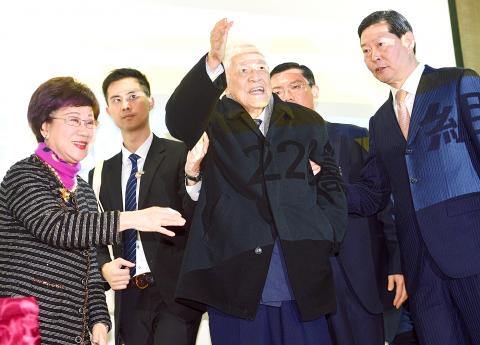A major coalition to campaign for a Taiwanese independence referendum was formed yesterday in what was the highest-level gathering of pro-independence advocates since the Democratic Progressive Party (DPP) administration took office, with former president Lee Teng-hui (李登輝) calling for a new constitution and name for the nation.
The Formosa Alliance (喜樂島聯盟), launched by Formosa TV chairman Kuo Bei-hung (郭倍宏), was joined by Lee, former president Chen Shui-bian (陳水扁), former vice president Annette Lu (呂秀蓮) and former presidential adviser Peng Ming-min (彭明敏), as well as the New Power Party, the Taiwan Solidarity Union, the Social Democratic Party and the Taiwan Radical Wings.
At a news conference in Taipei packed with hundreds of independence supporters, alliance representatives announced plans to formally launch on April 7, the anniversary of late democracy activist Deng Nan-jung’s (鄭南榕) self-immolation in 1989.

Photo: Peter Lo, Taipei Times
It said it would campaign for one year for a referendum, which it wants to hold on April 6 next year.
Taiwan’s sovereignty and political legitimacy come from the authorization of its 23 million people via direct elections and have nothing to do with China, Lee said.
“Although the relationship between Taiwan and China is in a very special state, it is undoubtedly a state-to-state relationship,” Lee said.
This special state is due to a misguided national identity shaped by the Chinese Nationalist Party (KMT) within the Republic of China (ROC) framework, he said, adding that it would require name rectification and a new constitution to formalize Taiwan’s statehood.
Lee said he had proposed the “ROC in Taiwan” framework and completed a series of constitutional amendments during his terms as president as a pragmatic approach to rebuild national identity and make progress on the goal of name rectification and promulgating a new constitution.
“With the Sunflower movement [in 2014] and the KMT’s defeats in 2014 and 2016, I think it is time to take action,” Lee said.
Taiwanese must vote in a democratic referendum to decide Taiwan’s future and make the nation a member of the UN under the name “Taiwan,” he added.
The alliance asked the DPP government to again revise the Referendum Act (公民投票法) to allow the referendum.
The latest amendment, which went into effect on Jan. 3, barred referendums on constitutional changes that would involve redefining the nation’s territory or changing its official title.
“President Tsai Ing-wen (蔡英文) has influenced many DPP lawmakers to ensure that she and the 113 legislators have a tight grip on the right to decide Taiwan’s future and the nation’s destiny,” the alliance said in a statement. “The alliance believes that [Tsai’s] methods are no different than the belief held by some Chinese that they have the right to decide Taiwan’s future and it also constitutes the severest infringement on 23.5 million Taiwanese’s right to self-determination.”

CHAOS: Iranians took to the streets playing celebratory music after reports of Khamenei’s death on Saturday, while mourners also gathered in Tehran yesterday Iranian Supreme Leader Ayatollah Ali Khamenei was killed in a major attack on Iran launched by Israel and the US, throwing the future of the Islamic republic into doubt and raising the risk of regional instability. Iranian state television and the state-run IRNA news agency announced the 86-year-old’s death early yesterday. US President Donald Trump said it gave Iranians their “greatest chance” to “take back” their country. The announcements came after a joint US and Israeli aerial bombardment that targeted Iranian military and governmental sites. Trump said the “heavy and pinpoint bombing” would continue through the week or as long

TRUST: The KMT said it respected the US’ timing and considerations, and hoped it would continue to honor its commitments to helping Taiwan bolster its defenses and deterrence US President Donald Trump is delaying a multibillion-dollar arms sale to Taiwan to ensure his visit to Beijing is successful, a New York Times report said. The weapons sales package has stalled in the US Department of State, the report said, citing US officials it did not identify. The White House has told agencies not to push forward ahead of Trump’s meeting with Chinese President Xi Jinping (習近平), it said. The two last month held a phone call to discuss trade and geopolitical flashpoints ahead of the summit. Xi raised the Taiwan issue and urged the US to handle arms sales to

BIG SPENDERS: Foreign investors bought the most Taiwan equities since 2005, signaling confidence that an AI boom would continue to benefit chipmakers Taiwan Semiconductor Manufacturing Co’s (TSMC, 台積電) market capitalization swelled to US$2 trillion for the first time following a 4.25 percent rally in its American depositary receipts (ADR) overnight, putting the world’s biggest contract chipmaker sixth on the list of the world’s biggest companies by market capitalization, just behind Amazon.com Inc. The site CompaniesMarketcap.com ranked TSMC ahead of Saudi Aramco and Meta Platforms Inc. The Taiwanese company’s ADRs on Tuesday surged to US$385.75 on the New York Stock Exchange, as strong demand for artificial intelligence (AI) applications led to chip supply constraints and boost revenue growth to record-breaking levels. Each TSMC ADR represents

State-run CPC Corp, Taiwan (CPC, 台灣中油) yesterday said that it had confirmed on Saturday night with its liquefied natural gas (LNG) and crude oil suppliers that shipments are proceeding as scheduled and that domestic supplies remain unaffected. The CPC yesterday announced the gasoline and diesel prices will rise by NT$0.2 and NT$0.4 per liter, respectively, starting Monday, citing Middle East tensions and blizzards in the eastern United States. CPC also iterated it has been reducing the proportion of crude oil imports from the Middle East and diversifying its supply sources in the past few years in response to geopolitical risks, expanding